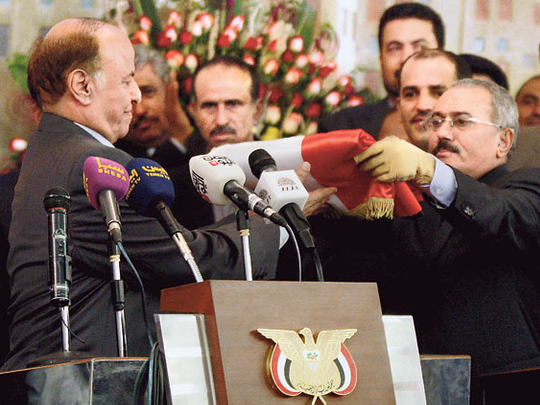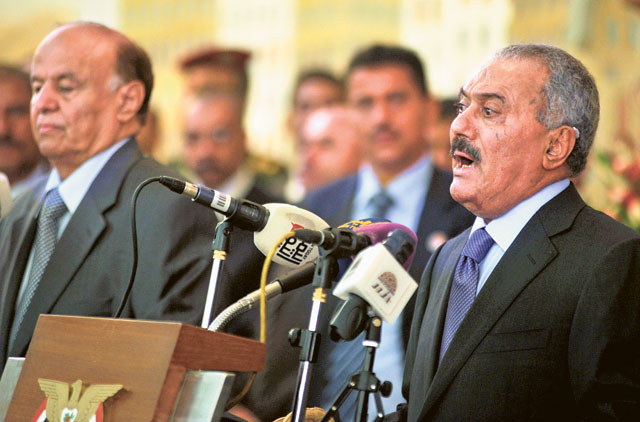
Sana'a: Yemen's former president Ali Abdullah Saleh officially declared on Monday the end of his three-decade-long rule of the poverty stricken-country.
Saleh was forced to sign in November last year a deal brokered by GCC in which he agreed to hand over power to his deputy Abd Rabbo Mansour Hadi. Saleh was offered a controversial immunity from prosecution.
"Today, I hand over the flag of revolution, republic, freedom and security to the safe hand of my colleague Abd Rabbo Mansour Hadi," he said as he handed Hadi the country's flag as symbol of the transfer of power.
In a farewell ceremony, boycotted by the opposition, Saleh congratulated the new president.
"We support the new president who is in favour of security and stability. The responsibilities are great, but we hope that he will tackle the repercussions of the crisis which greatly damaged the economy. I would like to assure you President Hadi that we stand by you in good times and bad times."
Saleh appeared fatigued as he was delivered his farewell speech. On the other hand, Hadi, who served as Saleh's deputy for 18 years, said that his country has laid the foundation for a peaceful transfer of power.
"There is a difficult and complex period ahead. The Yemeni people have sent a clear message that they stand by security, stability and change for the best."
According to the GCC peace deal, Hadi will be the president of Yemen during the two-year transitional period. He will call for a national conference to discuss thorny issues, reorganise the army and stimulate the economy. "I hope that after two years, I stand in the place of Ali Abdullah Saleh and give farewell to a former president and receive a new one."
The country's main opposition, Joint Meeting Party (JMP), refused to attend Saleh's farewell ceremony. The JMP informed the new president that his appearance in the presence of the former president will irritate the people who voted for him.
The opposition accused the former president of creating a scene to show that he willingly transferred power and was not forced to do so. Thousands of protesters took to the streets demanding Hadi strip Saleh's relatives of positions of power in the security forces.
Saleh's rise to power
Ali Abdullah Saleh is seen by observers as the longest-serving leader in Yemen's recent history. Following the assassinations of two presidents in the then North Yemen, Saleh took power in July 1978.
In May, 1990, Saleh and former South Yemen leader Ali Salim Al Baidh agreed to form a new country called Republic of Yemen. In 2004, Saleh waged an unfinished war on rebels in northern Yemen. Thousands of people were killed in the clashes that sporadically continued till 2010.
In 2006, Saleh announced that he would not run for another term. His supporters took to the streets demanding he revoke his decision. Also, a group of opposition parties formed the Joint Meeting Parties to challenge Saleh in the presidential elections in 2006. Saleh won the election and formed a new government.
In January 2009, Al Qaida in the Arabian Peninsula (AQAP) was formed, presenting a new challenge to Saleh's power. In May, 2009 Al Baidh ended his exile in Oman and publicly announced that he would work on pursuing the revival of the former South Yemen state.
Inspired by uprisings in Tunisia and Egypt, thousand of Yemenis organised rallies in early 2011, demanding Saleh's departure. Saleh survived an explosion in 2011. On November 23, 2011, Saleh signed a deal brokered by the GCC and handed power to his deputy, Abd Rabbo Mansour Hadi.













